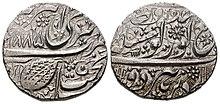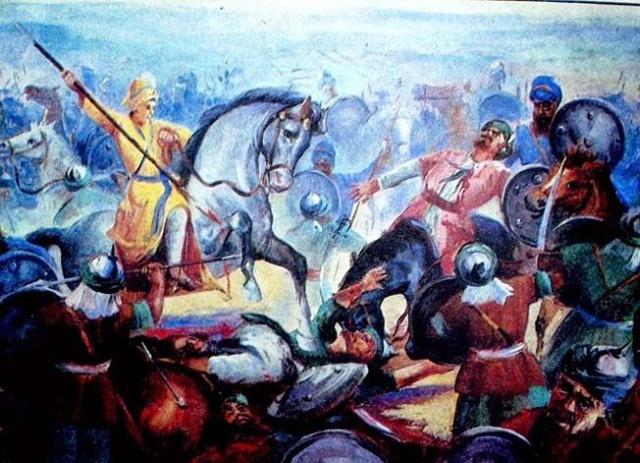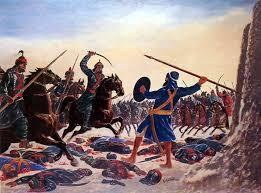Sikh Policy:
The Sikh Empire was idiosyncratic in that it allowed men from religions other than their own to rise to commanding positions of authority.
The Fakir brothers were trusted personal advisors and assistants as well as close friends to Ranjit Singh, particularly Fakir Azizuddin, who would serve in the positions of foreign minister of the empire and translator for the maharaja, and played important roles in such important events as the negotiations with the British, during which he convinced Ranjit Singh to maintain diplomatic ties with the British and not to go to war with them in 1808, as British troops were moved along the Sutlej in pursuance of the British policy of confining Ranjit Singh to the north of the river, and setting the Sutlej as the dividing boundary between the Sikh and British empires; negotiating with Dost Muhammad Khan during his unsuccessful attempt to retake Peshawar, and ensuring the succession of the throne during the maharaja's last days in addition to caretaking after a stroke, as well as occasional military assignments throughout his career. The Fakir brothers were introduced to the maharaja when their father, Ghulam Muhiuddin, a physician, was summoned by him to treat an eye ailment soon after his capture of Lahore.
The other Fakir brothers were Imamuddin, one of his principal administration officers, and Nuruddin, who served as home minister and personal physician, were also granted jagirs by the Maharaja.
Every year, while at Amritsar, Ranjit Singh visited shrines of holy people of other faiths, including several Muslim saints, which did not offend even the most religious Sikhs of his administration. As relayed by Fakir Nuruddin, orders were issued to treat people of all faith groups, occupations,and social levels equally and in accordance with the doctrines of their faith, per the Shastras and the Quran, as well as local authorities like judges and panches (local elder councils), as well as banning forcible possession of others' land or of inhabited houses to be demolished. There were special courts for Muslims which ruled in accordance to Muslim law in personal matters, and common courts preceded over by judicial officers which administered justice under the customary law of the districts and socio-ethnic groups, and were open to all who wanted to be governed by customary religious law, whether Hindu, Sikh, or Muslim.
One of Ranjit Singh's first acts after the 1799 capture of Lahore was to revive the offices of the hereditary Qazis and Muftis which had been prevalent in Mughal times. Kazi Nizamuddin was appointed to decide marital issues among Muslims, while Muftis Mohammad Shahpuri and Sadulla Chishti were entrusted with powers to draw up title-deeds relating to transfers of immovable property. The old mohalladari[definition needed] system was reintroduced with each mahallah, or neighborhood subdivision, placed under the charge of one of its members. The office of Kotwal, or prefect of police, was conferred upon a Muslim, Imam Bakhsh.
Generals were also drawn from a variety of communities, along with prominent Sikh generals like Hari Singh Nalwa, Fateh Singh Dullewalia, Nihal Singh Atariwala, Chattar Singh Attariwalla, and Fateh Singh Kalianwala; Hindu generals included Dewan Mokham Chand Nayyar, his son, and his grandson, and Misr Diwan Chand Nayyar; and Muslim generals included Ilahi Bakhsh and Mian Ghaus Khan; one general, Balbhadra Kunwar, was a Nepalese Gurkha, and European generals included Jean-Francois Allard, Jean-Baptiste Ventura, and Paolo Avitabile. other notable generals of the Sikh Khalsa Army were Veer Singh Dhillon, Sham Singh Attariwala, Mahan Singh Mirpuri, and Zorawar Singh Kahluria, among others.
The appointment of key posts in public offices was based on merit and loyalty, regardless of the social group or religion of the appointees, both in and around the court, and in higher as well as lower posts. Key posts in the civil and military administration were held by members of communities from all over the empire and beyond, including Sikhs, Muslims, Khatris, Brahmins, Dogras, Rajputs, Pashtuns, Europeans, and Americans, among others, and worked their way up the hierarchy to attain merit. Dhian Singh, the prime minister, was a Dogra, whose brothers Gulab Singh and Suchet Singh served in the high-ranking administrative and military posts, respectively. Brahmins like finance minister Raja Dina Nath, Sahib Dyal, and others also served in financial capacities.
Muslims in prominent positions included the Fakir brothers, Kazi Nizamuddin, and Mufti Muhammad Shah, among others. Among the top-ranking Muslim officers there were two ministers, one governor and several district officers; there were 41 high-ranking Muslim officers in the army, including two generals and several colonels, and 92 Muslims were senior officers in the police, judiciary, legal department and supply and store departments. In artillery Muslims represented over 50% of the numbers while the cavalry had some 10% Muslims from among the troopers.
Thus, the government was run by an elite corps drawn from many communities, giving the empire the character of a secular system of government, even when built on theocratic foundations.
A ban on cow slaughter, which can be related to Hindu sentiments, was universally imposed in the Sarkar Khalsaji. Ranjit Singh also donated large amounts of gold for the plating of the Kashi Vishwanath Temple's dome.
The Sikh Empire was idiosyncratic in that it allowed men from religions other than their own to rise to commanding positions of authority.
The Fakir brothers were trusted personal advisors and assistants as well as close friends to Ranjit Singh, particularly Fakir Azizuddin, who would serve in the positions of foreign minister of the empire and translator for the maharaja, and played important roles in such important events as the negotiations with the British, during which he convinced Ranjit Singh to maintain diplomatic ties with the British and not to go to war with them in 1808, as British troops were moved along the Sutlej in pursuance of the British policy of confining Ranjit Singh to the north of the river, and setting the Sutlej as the dividing boundary between the Sikh and British empires; negotiating with Dost Muhammad Khan during his unsuccessful attempt to retake Peshawar, and ensuring the succession of the throne during the maharaja's last days in addition to caretaking after a stroke, as well as occasional military assignments throughout his career. The Fakir brothers were introduced to the maharaja when their father, Ghulam Muhiuddin, a physician, was summoned by him to treat an eye ailment soon after his capture of Lahore.
The other Fakir brothers were Imamuddin, one of his principal administration officers, and Nuruddin, who served as home minister and personal physician, were also granted jagirs by the Maharaja.
Every year, while at Amritsar, Ranjit Singh visited shrines of holy people of other faiths, including several Muslim saints, which did not offend even the most religious Sikhs of his administration. As relayed by Fakir Nuruddin, orders were issued to treat people of all faith groups, occupations,and social levels equally and in accordance with the doctrines of their faith, per the Shastras and the Quran, as well as local authorities like judges and panches (local elder councils), as well as banning forcible possession of others' land or of inhabited houses to be demolished. There were special courts for Muslims which ruled in accordance to Muslim law in personal matters, and common courts preceded over by judicial officers which administered justice under the customary law of the districts and socio-ethnic groups, and were open to all who wanted to be governed by customary religious law, whether Hindu, Sikh, or Muslim.
One of Ranjit Singh's first acts after the 1799 capture of Lahore was to revive the offices of the hereditary Qazis and Muftis which had been prevalent in Mughal times. Kazi Nizamuddin was appointed to decide marital issues among Muslims, while Muftis Mohammad Shahpuri and Sadulla Chishti were entrusted with powers to draw up title-deeds relating to transfers of immovable property. The old mohalladari[definition needed] system was reintroduced with each mahallah, or neighborhood subdivision, placed under the charge of one of its members. The office of Kotwal, or prefect of police, was conferred upon a Muslim, Imam Bakhsh.
Generals were also drawn from a variety of communities, along with prominent Sikh generals like Hari Singh Nalwa, Fateh Singh Dullewalia, Nihal Singh Atariwala, Chattar Singh Attariwalla, and Fateh Singh Kalianwala; Hindu generals included Dewan Mokham Chand Nayyar, his son, and his grandson, and Misr Diwan Chand Nayyar; and Muslim generals included Ilahi Bakhsh and Mian Ghaus Khan; one general, Balbhadra Kunwar, was a Nepalese Gurkha, and European generals included Jean-Francois Allard, Jean-Baptiste Ventura, and Paolo Avitabile. other notable generals of the Sikh Khalsa Army were Veer Singh Dhillon, Sham Singh Attariwala, Mahan Singh Mirpuri, and Zorawar Singh Kahluria, among others.
The appointment of key posts in public offices was based on merit and loyalty, regardless of the social group or religion of the appointees, both in and around the court, and in higher as well as lower posts. Key posts in the civil and military administration were held by members of communities from all over the empire and beyond, including Sikhs, Muslims, Khatris, Brahmins, Dogras, Rajputs, Pashtuns, Europeans, and Americans, among others, and worked their way up the hierarchy to attain merit. Dhian Singh, the prime minister, was a Dogra, whose brothers Gulab Singh and Suchet Singh served in the high-ranking administrative and military posts, respectively. Brahmins like finance minister Raja Dina Nath, Sahib Dyal, and others also served in financial capacities.
Muslims in prominent positions included the Fakir brothers, Kazi Nizamuddin, and Mufti Muhammad Shah, among others. Among the top-ranking Muslim officers there were two ministers, one governor and several district officers; there were 41 high-ranking Muslim officers in the army, including two generals and several colonels, and 92 Muslims were senior officers in the police, judiciary, legal department and supply and store departments. In artillery Muslims represented over 50% of the numbers while the cavalry had some 10% Muslims from among the troopers.
Thus, the government was run by an elite corps drawn from many communities, giving the empire the character of a secular system of government, even when built on theocratic foundations.
A ban on cow slaughter, which can be related to Hindu sentiments, was universally imposed in the Sarkar Khalsaji. Ranjit Singh also donated large amounts of gold for the plating of the Kashi Vishwanath Temple's dome.
Sikh Policy:
The Sikh Empire was idiosyncratic in that it allowed men from religions other than their own to rise to commanding positions of authority.
The Fakir brothers were trusted personal advisors and assistants as well as close friends to Ranjit Singh, particularly Fakir Azizuddin, who would serve in the positions of foreign minister of the empire and translator for the maharaja, and played important roles in such important events as the negotiations with the British, during which he convinced Ranjit Singh to maintain diplomatic ties with the British and not to go to war with them in 1808, as British troops were moved along the Sutlej in pursuance of the British policy of confining Ranjit Singh to the north of the river, and setting the Sutlej as the dividing boundary between the Sikh and British empires; negotiating with Dost Muhammad Khan during his unsuccessful attempt to retake Peshawar, and ensuring the succession of the throne during the maharaja's last days in addition to caretaking after a stroke, as well as occasional military assignments throughout his career. The Fakir brothers were introduced to the maharaja when their father, Ghulam Muhiuddin, a physician, was summoned by him to treat an eye ailment soon after his capture of Lahore.
The other Fakir brothers were Imamuddin, one of his principal administration officers, and Nuruddin, who served as home minister and personal physician, were also granted jagirs by the Maharaja.
Every year, while at Amritsar, Ranjit Singh visited shrines of holy people of other faiths, including several Muslim saints, which did not offend even the most religious Sikhs of his administration. As relayed by Fakir Nuruddin, orders were issued to treat people of all faith groups, occupations,and social levels equally and in accordance with the doctrines of their faith, per the Shastras and the Quran, as well as local authorities like judges and panches (local elder councils), as well as banning forcible possession of others' land or of inhabited houses to be demolished. There were special courts for Muslims which ruled in accordance to Muslim law in personal matters, and common courts preceded over by judicial officers which administered justice under the customary law of the districts and socio-ethnic groups, and were open to all who wanted to be governed by customary religious law, whether Hindu, Sikh, or Muslim.
One of Ranjit Singh's first acts after the 1799 capture of Lahore was to revive the offices of the hereditary Qazis and Muftis which had been prevalent in Mughal times. Kazi Nizamuddin was appointed to decide marital issues among Muslims, while Muftis Mohammad Shahpuri and Sadulla Chishti were entrusted with powers to draw up title-deeds relating to transfers of immovable property. The old mohalladari[definition needed] system was reintroduced with each mahallah, or neighborhood subdivision, placed under the charge of one of its members. The office of Kotwal, or prefect of police, was conferred upon a Muslim, Imam Bakhsh.
Generals were also drawn from a variety of communities, along with prominent Sikh generals like Hari Singh Nalwa, Fateh Singh Dullewalia, Nihal Singh Atariwala, Chattar Singh Attariwalla, and Fateh Singh Kalianwala; Hindu generals included Dewan Mokham Chand Nayyar, his son, and his grandson, and Misr Diwan Chand Nayyar; and Muslim generals included Ilahi Bakhsh and Mian Ghaus Khan; one general, Balbhadra Kunwar, was a Nepalese Gurkha, and European generals included Jean-Francois Allard, Jean-Baptiste Ventura, and Paolo Avitabile. other notable generals of the Sikh Khalsa Army were Veer Singh Dhillon, Sham Singh Attariwala, Mahan Singh Mirpuri, and Zorawar Singh Kahluria, among others.
The appointment of key posts in public offices was based on merit and loyalty, regardless of the social group or religion of the appointees, both in and around the court, and in higher as well as lower posts. Key posts in the civil and military administration were held by members of communities from all over the empire and beyond, including Sikhs, Muslims, Khatris, Brahmins, Dogras, Rajputs, Pashtuns, Europeans, and Americans, among others, and worked their way up the hierarchy to attain merit. Dhian Singh, the prime minister, was a Dogra, whose brothers Gulab Singh and Suchet Singh served in the high-ranking administrative and military posts, respectively. Brahmins like finance minister Raja Dina Nath, Sahib Dyal, and others also served in financial capacities.
Muslims in prominent positions included the Fakir brothers, Kazi Nizamuddin, and Mufti Muhammad Shah, among others. Among the top-ranking Muslim officers there were two ministers, one governor and several district officers; there were 41 high-ranking Muslim officers in the army, including two generals and several colonels, and 92 Muslims were senior officers in the police, judiciary, legal department and supply and store departments. In artillery Muslims represented over 50% of the numbers while the cavalry had some 10% Muslims from among the troopers.
Thus, the government was run by an elite corps drawn from many communities, giving the empire the character of a secular system of government, even when built on theocratic foundations.
A ban on cow slaughter, which can be related to Hindu sentiments, was universally imposed in the Sarkar Khalsaji. Ranjit Singh also donated large amounts of gold for the plating of the Kashi Vishwanath Temple's dome.
0 Комментарии
0 Поделились
0 предпросмотр










